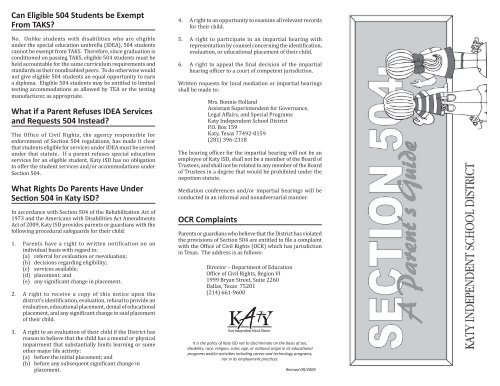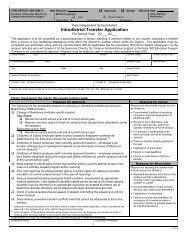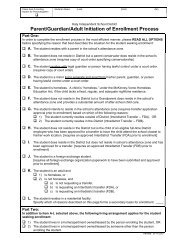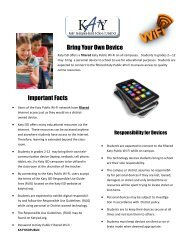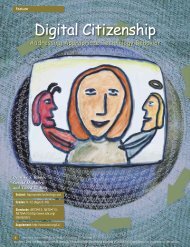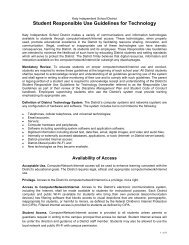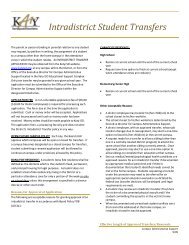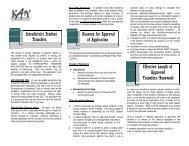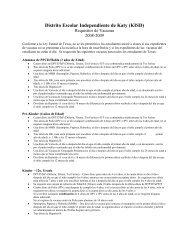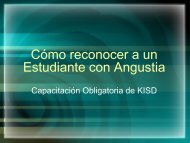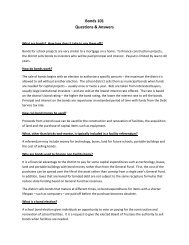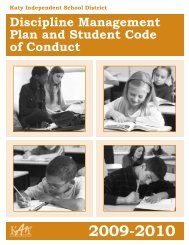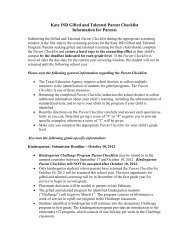Section 504, A Parent's Guide - Katy ISD
Section 504, A Parent's Guide - Katy ISD
Section 504, A Parent's Guide - Katy ISD
You also want an ePaper? Increase the reach of your titles
YUMPU automatically turns print PDFs into web optimized ePapers that Google loves.
Can Eligible <strong>504</strong> Students be Exempt<br />
From TAKS?<br />
No. Unlike students with disabilities who are eligible<br />
under the special education umbrella (IDEA), <strong>504</strong> students<br />
cannot be exempt from TAKS. Therefore, since graduation is<br />
conditioned on passing TAKS, eligible <strong>504</strong> students must be<br />
held accountable for the same curriculum requirements and<br />
standards as their nondisabled peers. To do otherwise would<br />
not give eligible <strong>504</strong> students an equal opportunity to earn<br />
a diploma. Eligible <strong>504</strong> students may be entitled to limited<br />
testing accommodations as allowed by TEA or the testing<br />
manufacturer, as appropriate.<br />
What if a Parent Refuses IDEA Services<br />
and Requests <strong>504</strong> Instead?<br />
The Office of Civil Rights, the agency responsible for<br />
enforcement of <strong>Section</strong> <strong>504</strong> regulations, has made it clear<br />
that students eligible for services under IDEA must be served<br />
under that statute. If a parent refuses special education<br />
services for an eligible student, <strong>Katy</strong> <strong>ISD</strong> has no obligation<br />
to offer the student services and/or accommodations under<br />
<strong>Section</strong> <strong>504</strong>.<br />
What Rights Do Parents Have Under<br />
<strong>Section</strong> <strong>504</strong> in <strong>Katy</strong> <strong>ISD</strong>?<br />
In accordance with <strong>Section</strong> <strong>504</strong> of the Rehabilitation Act of<br />
1973 and the Americans with Disabilities Act Amendments<br />
Act of 2009, <strong>Katy</strong> <strong>ISD</strong> provides parents or guardians with the<br />
following procedural safeguards for their child:<br />
1. Parents have a right to written notification on an<br />
individual basis with regard to:<br />
(a) referral for evaluation or reevaluation;<br />
(b) decisions regarding eligibility;<br />
(c) services available;<br />
(d) placement; and<br />
(e) any significant change in placement.<br />
2. A right to receive a copy of this notice upon the<br />
district’s identification, evaluation, refusal to provide an<br />
evaluation, educational placement, denial of educational<br />
placement, and any significant change in said placement<br />
of their child.<br />
3. A right to an evaluation of their child if the District has<br />
reason to believe that the child has a mental or physical<br />
impairment that substantially limits learning or some<br />
other major life activity:<br />
(a) before the initial placement; and<br />
(b) before any subsequent significant change in<br />
placement.<br />
4. A right to an opportunity to examine all relevant records<br />
for their child.<br />
5. A right to participate in an impartial hearing with<br />
representation by counsel concerning the identification,<br />
evaluation, or educational placement of their child.<br />
6. A right to appeal the final decision of the impartial<br />
hearing officer to a court of competent jurisdiction.<br />
Written requests for local mediation or impartial hearings<br />
shall be made to:<br />
Mrs. Bonnie Holland<br />
Assistant Superintendent for Governance,<br />
Legal Affairs, and Special Programs<br />
<strong>Katy</strong> Independent School District<br />
P.O. Box 159<br />
<strong>Katy</strong>, Texas 77492-0159<br />
(281) 396-2318<br />
The hearing officer for the impartial hearing will not be an<br />
employee of <strong>Katy</strong> <strong>ISD</strong>, shall not be a member of the Board of<br />
Trustees, and shall not be related to any member of the Board<br />
of Trustees in a degree that would be prohibited under the<br />
nepotism statute.<br />
Mediation conferences and/or impartial hearings will be<br />
conducted in an informal and nonadversarial manner.<br />
OCR Complaints<br />
Parents or guardians who believe that the District has violated<br />
the provisions of <strong>Section</strong> <strong>504</strong> are entitled to file a complaint<br />
with the Office of Civil Rights (OCR) which has jurisdiction<br />
in Texas. The address is as follows:<br />
Director – Department of Education<br />
Office of Civil Rights, Region VI<br />
1999 Bryan Street, Suite 2260<br />
Dallas, Texas 75201<br />
(214) 661-9600<br />
It is the policy of <strong>Katy</strong> <strong>ISD</strong> not to discriminate on the basis of sex,<br />
disability, race, religion, color, age, or national origin in its educational<br />
programs and/or activities including career and technology programs,<br />
nor in its employment practices.<br />
Revised 09/2009
What is <strong>Section</strong> <strong>504</strong>?<br />
<strong>Section</strong> <strong>504</strong> of the Rehabilitation Act of 1973 is a federal law<br />
that prohibits discrimination on the basis of disability. Unlike<br />
the Individuals with Disabilities Education Act (IDEA) that<br />
governs special education, <strong>Section</strong> <strong>504</strong> is not an education,<br />
service, or funding statute. The purpose of <strong>Section</strong> <strong>504</strong> is to<br />
ensure that individuals with disabilities are given the same<br />
opportunity to participate in programs and activities as are<br />
their nondisabled peers.<br />
It is the responsibility of <strong>Katy</strong> Independent School District<br />
to identify and serve students who, within the intent of<br />
<strong>Section</strong> <strong>504</strong> of the Rehabilitation Act of 1973, are considered<br />
disabled and who, because of disability, need special services/<br />
accommodations within the general education program.<br />
Who is Eligible Under <strong>Section</strong> <strong>504</strong>?<br />
Students may qualify for protection under <strong>Section</strong><br />
<strong>504</strong> if they have a mental or physical impairment that<br />
substantially limits one or more of life’s major activities.<br />
A label, disability, or diagnosis, alone, does not make a<br />
student eligible under <strong>Section</strong> <strong>504</strong>. The disability must<br />
substantially limit the student’s performance as compared<br />
to the performance of the average student in the general<br />
population.<br />
If a student does not qualify under <strong>Section</strong> <strong>504</strong> but<br />
requires instructional and/or behavioral interventions<br />
beyond those available in general education, the District<br />
will meet the student’s needs through its Response to<br />
Intervention (RTI) process.<br />
Students may be eligible for services under <strong>Section</strong> <strong>504</strong><br />
even though they do not meet the eligibility criteria for one<br />
of the disabling conditions covered by the Individuals with<br />
Disabilities Education Act (IDEA). Students eligible for<br />
services under IDEA are not addressed in these guidelines.<br />
What is Meant by “Substantially Limits”?<br />
Under judicial interpretation, a major life activity is<br />
substantially limited when a person is “unable to perform<br />
a major life activity that the average person in the general<br />
population can perform.”<br />
In referencing the “general population”, the intent of the<br />
law was to compare each person’s performance against the<br />
general population in the community and the nation – not<br />
the population at a particular school.<br />
What is a Major Life Activity?<br />
Major life activities refer to functions such as, but not limited<br />
to, caring for oneself, eating, sleeping, reading, walking,<br />
seeing, hearing, bending, standing, speaking, breathing,<br />
thinking, concentrating, communicating, and performing<br />
manual tasks. Major life activities also include major bodily<br />
functions of the immune system, bladder, bowel, brain,<br />
respiratory, circulatory, and endocrine functions, as well as,<br />
normal cell development.<br />
Where Does RTI Fit in the <strong>504</strong> Process?<br />
<strong>Katy</strong> <strong>ISD</strong> uses a tiered Response to Intervention (RTI)<br />
model as a system for determining whether a student may<br />
have need for referral to <strong>504</strong>. It is through the RTI process<br />
that campuses document their efforts to meet the needs of<br />
individual students who are struggling as a result of academic,<br />
physical, or behavioral difficulties.<br />
All students receive differentiated instruction in their general<br />
education classes at Tier I. A student, who makes minimal<br />
or no progress academically at Tier I, may be referred to an<br />
RTI Collaborative Team to determine whether the student<br />
requires targeted supplementary intervention at Tier II. For<br />
elementary students, this involves a second class in a content<br />
area. Secondary students, on the other hand, may need an<br />
academic intervention elective. Tier II is still a part of the<br />
general education program. If the student does not make<br />
progress at this level, the student may require more intensive<br />
interventions at Tier III and/or a referral to <strong>504</strong>.<br />
Students with physical and/or behavioral needs are typically<br />
served within the general education classroom with<br />
appropriate levels of support from an LSSP or school nurse.<br />
What are the Referral Procedures?<br />
• In most cases, students referred to a Campus <strong>504</strong><br />
Coordinator will have been served previously through<br />
the RTI process.<br />
• Any student may be referred for a <strong>504</strong> evaluation by a<br />
parent, teacher, counselor, administrator, or other District<br />
employee who is knowledgeable about the student and<br />
has reason to believe that the student has a disability that<br />
is substantially limiting one of life’s major activities.<br />
• All referrals must be submitted in writing to an official<br />
Campus <strong>504</strong> Coordinator who will prepare and send all<br />
required notices.<br />
What Constitutes an Evaluation Under<br />
<strong>Section</strong> <strong>504</strong>?<br />
An evaluation under <strong>Section</strong> <strong>504</strong> usually does not involve<br />
testing. It may consist of a review and analysis of existing<br />
records such as vision and hearing screening, TAKS scores,<br />
attendance records, discipline records, educational history,<br />
current academic performance, teacher observations, and<br />
behavior. Data provided from external sources is also<br />
considered, but within the context of the school.<br />
A <strong>504</strong> Committee is responsible for reviewing and analyzing<br />
the evaluation data and for making decisions regarding a<br />
student’s eligibility based upon current legal standards.<br />
Who Makes Up the Membership of<br />
the <strong>504</strong> Committee?<br />
The federal regulations governing <strong>Section</strong> <strong>504</strong> do not specify<br />
the titles or classifications of individuals who must participate<br />
in a <strong>504</strong> Committee. The regulations do state that the <strong>504</strong><br />
Committee must include “a group of persons knowledgeable<br />
about the child, the meaning of the evaluation data, and the<br />
placement options.”<br />
While parents are not required members of a <strong>504</strong> Committee<br />
in the regulations, <strong>Katy</strong> <strong>ISD</strong> encourages parent participation.<br />
How is Placement Defined?<br />
In the context of <strong>504</strong>, “placement” refers to the general<br />
education classroom or program with individually planned<br />
accommodations or interventions. Placement may include<br />
such things as tutorials, math lab, block math classes, or<br />
reading improvement classes. In other words, an eligible<br />
<strong>504</strong> student is entitled to the same access to programs and<br />
activities as any other student. The District is not required<br />
to alter requirements or standards for participation. There<br />
is no modification of the essential knowledge and skills for<br />
<strong>504</strong> students. Eligibility under <strong>Section</strong> <strong>504</strong> is not intended<br />
to reduce expectations for students with disabilities.<br />
The intent of <strong>504</strong> is to provide eligible students with<br />
reasonable accommodations that will give them an equal<br />
chance to achieve.


